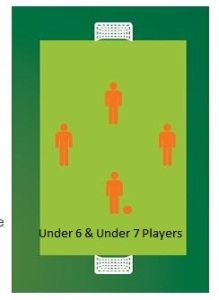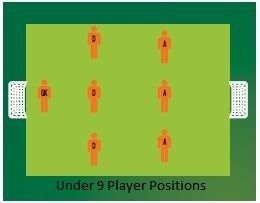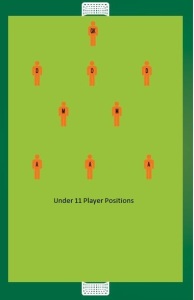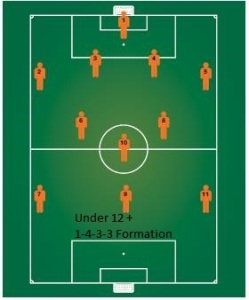Team Manager Info.




Under 6 and Under 7 Age Group:
Thank you for making the effort to manage this football team this season. Your enthusiasm and effort will help all the children enjoy their football experience. Below are some Managers tips to get you started:
Managing Tips:
- Teams of 4 players (no goalkeepers). No players are to stand in front of the goal for the whole game.
- No ‘coaching’ only stimulating and praising
- ‘Natural’ development through just playing and discovering through trial & error.
- Emphasis on fun and building a love of the game.
- In 4 v 4 football, the ‘coach’ should not worry about ‘tactics’ other than encouraging the kids to try and score when they have the ball and win it back when the other team has the ball in order to prevent them from scoring.
- Players should also be encouraged to pass the ball to each other & try to score.
- Aim for equal playing time for all children.
Manager Responsibilities
- Collection of team jerseys at the start of the season
- Collect the shirts and wash them each week.
- Setting an example by being at the correct field 15 minutes prior to the start of each game and doing a warm up with the kids.
- Helping the kids get on the field ready to play.
- In conjunction with the opposite manager “referee” as an instructing Game Leader.
- Allocate to ANOTHER parent the job of time keeper and rotating the children from the sideline. You are not expected to be ensuring all the kids have equal time while managing the on-field game. Delegate to another parent.
- Ensure the children play and finish the game in an atmosphere of good teamwork and sportsmanship.
- Return of all team jerseys at the end of the season.
- If you have any concerns or queries during the season please contact your age co-ordinator.
Under 9 Age Group:
Thank you for making the effort to manage this football team this season. Your enthusiasm and effort will help all the children enjoy their football experience. Below are some Managers tips to get you started:
Manager Responsibilities
- Collection of team jerseys at the start of the season
- Collect the shirts and wash them each week.
- Setting an example by being at the correct field 15 minutes prior to the start of each game.
- Helping the kids get on the field ready to play.
- Referees in most games will be supplied. Your role is to be a “Game Leader”.
- Allocate to ANOTHER parent to job of time keeper and rotating the children from the sideline. You are not expected to be ensuring all the kids have equal time while managing the on-field game. Delegate to another parent.
- Ensure the children play and finish the game in an atmosphere of good teamwork and sportsmanship.
- Return of all team jerseys at the end of the season.
- If you have any concerns or queries during the season please contact your age co-ordinator.
Instructing Game Leader
Under U9 age group
The main role of the instructing referee is to control the game to ensure it is played fluently and instruct and correct the players (with minimal blowing of the whistle) on how to behave and what the rules are, e.g. what a foul is, what a free kick is and how to throw in etc... Should these indiscretions happen a second time the referee should stop the game and apply the appropriate action and decisions. This person can be a club official, capable parent, older child or player, beginning or official referee from the federation or association.
The basic laws and playing conditions;
• Number of players – Under 9 – 7 players per side (including goalkeeper)
• Ball size – Under 8 & 9 – Size 3
• Start of play & re-start after a goal
Pass forward to a team mate from the middle of the half way line. All players must be in their own half of the field of play. Opponents must be at least 5m away from the ball until it is in play. The ball must touch a team mate before a goal can be scored.
• Ball crossing the touch line – Throw in. Opponents must be at least 5m
away from the ball until it is in play.
• Ball crossing the goal line after touching the defending team last –
Corner kick. Opponents must be at least 5m away from the ball until it is in play.
• Ball crossing the goal line after touching the attacking team last – Goal kick from anywhere within the penalty area. Opponents remain at least 5m outside the penalty area until the ball is in play. The ball is in play once it is kicked directly out of the penalty area.
• Goalkeepers – The goalkeeper is allowed to handle the ball anywhere in the penalty area. To restart play after a save or gathering the ball with their hands, the ball must be thrown or rolled from the hands or played from the ground with their feet, within 6 seconds. The goalkeeper is not allowed to kick or drop kick the ball directly from their hands. Opponents must be at least 5m outside the penalty area and cannot move inside the penalty area until the ball is in play.
The ball is in play once it moves out of the penalty area.
• Offside – No offside
• Fouls and misconduct – Indirect free kicks are awarded for all acts of handball or fouls and misconduct with opponents at least 5m away from the ball. (An indirect free kick is where a goal can be scored only if the ball subsequently touches another player before it enters the goal). For deliberate or serious acts of handball or fouls and misconduct in the penalty area, a penalty kick is awarded from an 8m penalty mark with only a goalkeeper in position. All other players must be outside the penalty area and be at least 5m behind the penalty mark.
“Small Sided Football is implemented for the development and enjoyment of the children. It’s their game, we as adults only need to create a stimulating and entertaining environment for them”
Positional Play
In the U9 age group we begin to move towards children understanding positions. The basic positions we suggest are shown below. A tip is to use coloured hair bands worn on the wrist to remind players of their positions (3 x red Defenders, 3 x Yellow Attackers).
The players now begin to understand what the game’s purpose is (winning by scoring more goals than the opponent). There will still be a lot of individual play but the players start to understand that they have to work together in order to be successful.
• A basic ‘feeling’ for team play, direction and dealing with an opponent starts to develop
• Preference and talent for a specific position starts to show: you can start working on a basic organisation (1 in goal; 3 at the back; 3 up front) and a basic understanding of some team tasks (how to defend and attack as a team)
• The coach should still let every player play in every position regularly. One week they want to be goalie, next time the centre forward. Let them!
• Bigger goals with goalkeepers automatically appeal to aiming and shooting: give them all plenty of opportunities to shoot (or be the goalkeeper).
• In 7 v 7 football, the coach should still not be too concerned with ‘tactics’. The focus in
training is on the individual player, so in the weekend game the players should have the
opportunity to apply their skills in a game setting. The coach organises the players into two lines of three with a Goalkeeper behind. The players just need simple tasks so they do not become confused or overwhelmed with information (Examples: ‘You three try to defend more than you attack’ ‘you three try to attack more than you defend’ ‘let’s see if we can always have one of our players pushed right up in the middle of the pitch’ ‘when the opponent has the ball, can we get one of our team near every one of their players on the goal side’, etc)
• At half-time, the coach should rotate players around to experience different aspects of the game (e.g. the three defenders become the three attackers)
• Aim for equal playing time
--------------------------------------------------------------------------------------------------------------------------
Under 11 Age Group:
Thank you for making the effort to manage this football team for the season. Your enthusiasm and effort will help all the children enjoy their football experience. Below are some tips to get you started:
Coaching tips
• The understanding of working together as a team develops more and more.
• The awareness of the individual roles in relation to teamwork is also developing as well as the understanding for acting without the ball both in defence and attack.
• With 8 outfield players a tighter and more strict task allocation and use of space is required.
• Preference/ability for specific positions becomes more and more clear.
• At this age the players are very competitive and clever and very quickly develop their motor skills.
• All the above means that the coach can raise the bar on all these aspects but:
o Avoid an information ‘overkill’
o Keep it simple (speak their language)
o It’s their game, it’s not about the coach
• In 9 v 9, the coach organises the players into three lines with a goalkeeper behind, preferably in a 1-3-2-3 formation as a guide for team shape.
• The coach is still not too concerned with tactics or obsessed with results.
• The players still just need simple tasks on match day.
• The players should still be regularly rotated, either at half-time or from game to game.
• Avoid playing the best players in central positions, and ‘hiding’ the weaker players out wide.
• Aim for equal playing time.
Manager Responsibilities
- Collection of team jerseys at the start of the season.
- Collect the shirts and wash them each week.
- Setting an example by being at the correct field 15 minutes prior to the start of each game and doing a brief warm up with the players.
- Helping the kids get on the field ready to play.
- Referees in most games will be supplied.
- Allocate to ANOTHER parent to job of time keeper and rotating the children from the sideline. You are not expected to be ensuring all the kids have equal time while managing the on-field game. Delegate to another parent.
- Ensure the children play and finish the game in an atmosphere of good teamwork and sportsmanship.
- Return of all team jerseys at the end of the season.
- If you have any concerns or queries during the season please contact your age co-ordinator.
Instructing Referee – Under U11 age group
The main role of the instructing referee is to control the game to ensure it is played fluently and instruct and correct the players (with minimal blowing of the whistle) on how to behave and what the rules are, e.g. what a foul is, what a free kick is and how to throw in etc. Should these indiscretions happen a second time the referee should stop the game and apply the appropriate action and decisions. This person can be a club official, capable parent, older child or player, beginning or official referee from the federation or association








